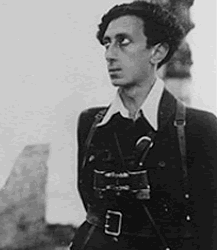Vilna
Stories
Click
on Photos to Enlarge
Abba
Kovner and Resistance in the Vilna Ghetto
In the Vilna Ghetto and in the Rudninkai Forest (both in Lithuania), Abba Kovner, only 25 years old, led resistance fighters against the murderous Nazi enemy.
for the rest go to;
http://history1900s.about.com/library/holocaust/aa030799.htm
....Abba Kovner as one of his (Yitzhak Wittenberg) lieutenants, the FPO set out to unite all the ghetto resistance groups, launch an uprising in the event of the ghetto’s liquidation, carry out sabotage, and encourage Jews outside of Vilna to take up arms and fight. To these ends, the Vilna ghetto fighters blew up a German military train, smuggled in arms, sabotaged German military equipment, set up an illegal printing press outside of the ghetto, and established ties to the Soviet resistance in the city and the forests. They also sent emissaries to the Warsaw and Bialystok ghettos to warn the inhabitants about the mass killings of Jews in the occupied Soviet Union and to incite resistance
In July 1943, German Security Police learned of Wittenberg’s resistance activities, after arresting several leaders of Vilna’s Communist underground organization. German police officials appeared before the ghetto’s Jewish leadership and threatened to destroy the ghetto and its 20,000 inhabitants unless the FPO leader was turned over to them. Fearful of massive German reprisals, the ghetto’s leaders and inhabitants called for Wittenberg’s surrender. The ghetto fighters mobilized for action and even rescued their commander from the police, yet under such tremendous pressure, the FPO was compelled to give up Wittenberg. Abiding by his group’s decision, he turned himself in, but committed suicide while in German hands.
Following Wittenberg’s death, Kovner took up the command of the FPO, and during the summer and fall of 1943, his fighters clashed with German forces within and without the ghetto. On September 1, the FPO mobilized its forces when German and Baltic police units entered the ghetto to round up Jews for deportation to Estonian labor camps. Fearing that the ghetto was to be liquidated, the Jewish underground called for an uprising. Though one of its units opened fire on German troops, the ghetto’s population did not heed the FPOs call to arms. The Jewish underground was thus forced to alter its strategy. As the ghetto’s final liquidation approached, Kovner and hundreds of the ghetto fighters escaped through the city’s sewers and other outlets to the forests where they joined Soviet partisans in many combat missions.
In 1944-45, Kovner helped to lay the foundations for the organized mass exodus of surviving Jews from Eastern Europe through the closed gates of British-controlled Palestine. He later became a noted poet and writer and was awarded the Israel Prize in Literature in 1970. The Miles
Lerman Center
for the Study of Jewish Resistance www.ushmm.org/.../resistance/ awards/vilna.php
In the Vilna Ghetto and in the Rudninkai Forest (both in Lithuania), Abba Kovner, only 25 years old, led resistance fighters against the murderous Nazi enemy.
for the rest go to;
http://history1900s.about.com/library/holocaust/aa030799.htm
....Abba Kovner as one of his (Yitzhak Wittenberg) lieutenants, the FPO set out to unite all the ghetto resistance groups, launch an uprising in the event of the ghetto’s liquidation, carry out sabotage, and encourage Jews outside of Vilna to take up arms and fight. To these ends, the Vilna ghetto fighters blew up a German military train, smuggled in arms, sabotaged German military equipment, set up an illegal printing press outside of the ghetto, and established ties to the Soviet resistance in the city and the forests. They also sent emissaries to the Warsaw and Bialystok ghettos to warn the inhabitants about the mass killings of Jews in the occupied Soviet Union and to incite resistance
In July 1943, German Security Police learned of Wittenberg’s resistance activities, after arresting several leaders of Vilna’s Communist underground organization. German police officials appeared before the ghetto’s Jewish leadership and threatened to destroy the ghetto and its 20,000 inhabitants unless the FPO leader was turned over to them. Fearful of massive German reprisals, the ghetto’s leaders and inhabitants called for Wittenberg’s surrender. The ghetto fighters mobilized for action and even rescued their commander from the police, yet under such tremendous pressure, the FPO was compelled to give up Wittenberg. Abiding by his group’s decision, he turned himself in, but committed suicide while in German hands.
Following Wittenberg’s death, Kovner took up the command of the FPO, and during the summer and fall of 1943, his fighters clashed with German forces within and without the ghetto. On September 1, the FPO mobilized its forces when German and Baltic police units entered the ghetto to round up Jews for deportation to Estonian labor camps. Fearing that the ghetto was to be liquidated, the Jewish underground called for an uprising. Though one of its units opened fire on German troops, the ghetto’s population did not heed the FPOs call to arms. The Jewish underground was thus forced to alter its strategy. As the ghetto’s final liquidation approached, Kovner and hundreds of the ghetto fighters escaped through the city’s sewers and other outlets to the forests where they joined Soviet partisans in many combat missions.
In 1944-45, Kovner helped to lay the foundations for the organized mass exodus of surviving Jews from Eastern Europe through the closed gates of British-controlled Palestine. He later became a noted poet and writer and was awarded the Israel Prize in Literature in 1970. The Miles
Lerman Center
for the Study of Jewish Resistance www.ushmm.org/.../resistance/ awards/vilna.php
